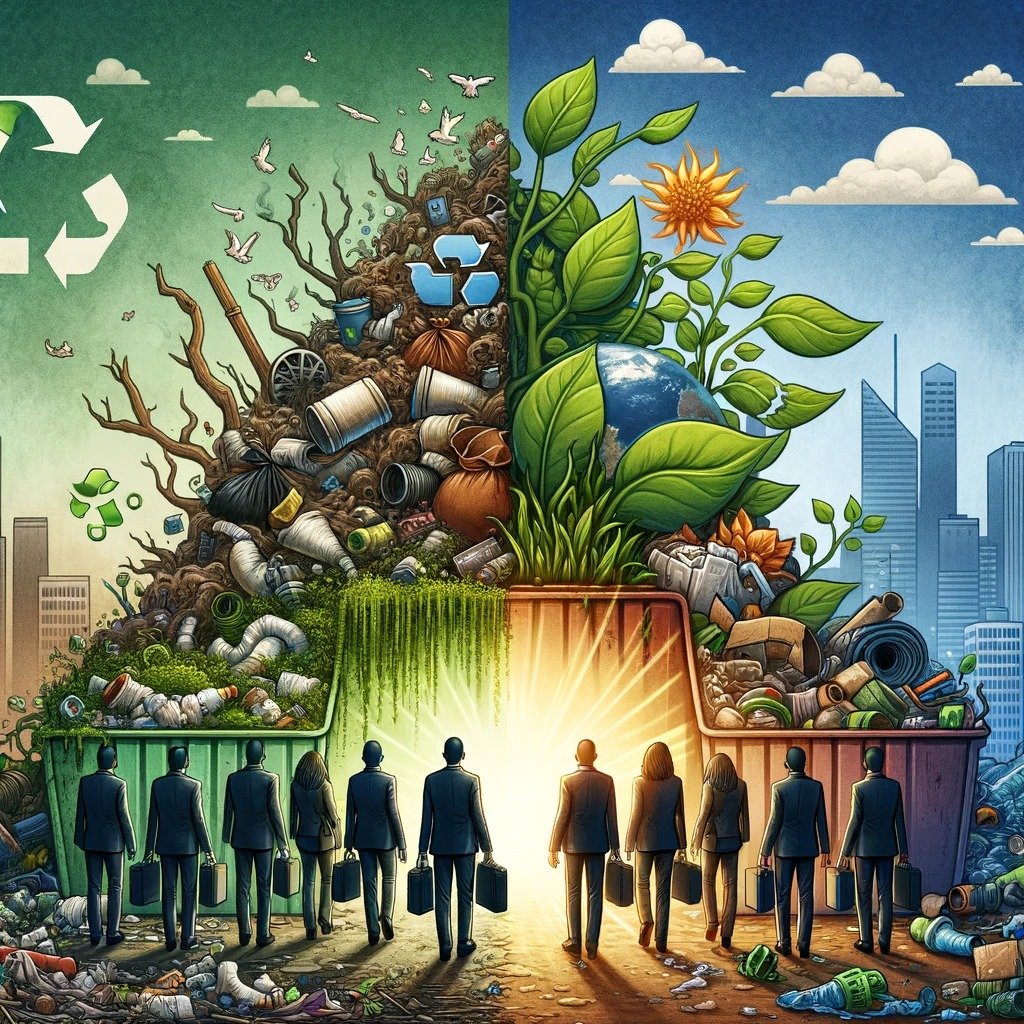From Waste to Worth: How to Turn Trash into a Sustainable Business Opportunity

In a world where environmental sustainability is becoming increasingly important, businesses are constantly seeking ways to reduce their carbon footprint and incorporate eco-friendly practices. One solution that is gaining momentum is turning waste into a valuable resource. From repurposing materials to creating new products from recycled materials, businesses are finding innovative ways to turn trash into a sustainable business opportunity. In this blog post, we will explore the benefits of this approach and provide tips on how your business can make a positive impact on the environment while also generating profits.
1. Understanding the Concept of Turning Trash into Treasure
In today’s world, where sustainability is a top priority, the concept of turning trash into treasure is gaining significant attention. But what exactly does this concept entail? Essentially, it involves taking waste materials and transforming them into valuable resources or products, creating a sustainable business opportunity in the process.
The idea behind turning trash into treasure is not just about reducing waste and minimizing environmental impact, although these are crucial aspects. It’s about recognizing the untapped potential of what might be considered as “waste” and finding creative ways to give it new life. Instead of viewing waste as a burden, businesses can see it as an opportunity to innovate and contribute to a greener future.
One example of turning trash into treasure is the repurposing of materials. Many waste products, such as scrap metal, plastic bottles, or discarded wood, can be repurposed into useful items. For instance, recycled plastic can be transformed into furniture, clothing, or even building materials. By reimagining waste as a valuable resource, businesses can not only reduce their reliance on new raw materials but also help to divert waste from landfills.
Another approach is creating new products from recycled materials. Companies are finding innovative ways to use waste as a raw material for their products. For instance, fashion brands are now designing clothes made from recycled plastic bottles or discarded textiles. Similarly, furniture companies are crafting unique pieces from reclaimed wood or recycled materials. These businesses not only contribute to waste reduction but also tap into the growing market demand for sustainable products.
By embracing the concept of turning trash into treasure, businesses can reap numerous benefits. First and foremost, they can significantly reduce their carbon footprint. By repurposing waste materials or using recycled ones, companies can minimize the extraction of new resources and decrease energy consumption, resulting in a positive environmental impact.
Furthermore, turning trash into treasure offers a compelling business opportunity. Consumers are increasingly seeking sustainable and eco-friendly products. By incorporating recycled or repurposed materials into their offerings, businesses can attract environmentally-conscious customers and differentiate themselves in the market. This, in turn, can lead to increased brand loyalty, customer satisfaction, and ultimately, higher profits.
2. Case Studies: Successful Companies that Transformed Waste into Profitable Business
When it comes to turning trash into a sustainable business opportunity, there are many companies that have successfully made a profit while reducing their environmental impact. Let’s take a look at some inspiring case studies that showcase how these businesses have transformed waste into valuable resources.
One notable example is Patagonia, an outdoor clothing company that has become a champion of sustainability. Patagonia has a garment recycling program that encourages customers to return their worn-out clothing to be recycled into new products. They then use these recycled materials to create new garments, reducing the need for virgin resources. By taking a proactive approach to waste management, Patagonia has not only decreased their carbon footprint but also strengthened their brand’s commitment to sustainability, attracting environmentally-conscious consumers.
Another success story is Interface, a global modular flooring company. Interface has been on a mission to eliminate any negative impact they have on the environment by 2020. They have developed a program called ReEntry that reclaims and recycles their old carpets. The reclaimed materials are then used to create new flooring products, closing the loop on waste and reducing the need for new resources. Through this innovative approach, Interface has not only reduced their waste output but has also positioned themselves as leaders in sustainable flooring solutions.
Furniture retailer IKEA is another company that has embraced the concept of turning trash into treasure. They have invested in their own circular economy initiative, which involves collecting and recycling used furniture from customers. The materials from these recycled products are then used to create new furniture, reducing the demand for new raw materials. By implementing this program, IKEA has not only reduced waste but has also made sustainable furniture more accessible and affordable for their customers.
These case studies highlight the many benefits of turning waste into a sustainable business opportunity. By adopting eco-friendly practices and finding creative ways to repurpose materials, these companies have not only reduced their environmental impact but have also gained a competitive edge in the market. They have attracted environmentally-conscious customers, enhanced their brand reputation, and generated profits while contributing to a greener future.
These success stories demonstrate that it is possible for businesses of all sizes and industries to turn trash into a valuable resource. By thinking outside the box, identifying waste streams, and finding innovative solutions, companies can make a positive impact on the environment while also generating profits. It’s a win-win situation that not only benefits businesses but also the planet we call home.
3. Steps to Create Your Own Sustainable Business Using Eco-friendly Methods
Creating a sustainable business using eco-friendly methods may seem like a daunting task, but with the right approach and mindset, it can be achieved. Here are some steps to help you get started on your journey to turning trash into a sustainable business opportunity.
1. Identify Waste Streams: The first step is to assess your current waste generation and identify the potential waste streams that can be repurposed or recycled. Look for materials that are commonly discarded and explore ways to give them a new life. For example, if you run a restaurant, you can repurpose food scraps into compost or partner with local farms for animal feed.
2. Research and Innovation: Once you have identified your waste streams, conduct research to understand the potential uses and markets for these materials. Look for innovative ways to repurpose or transform them into valuable resources or products. Stay updated on the latest trends and technologies in waste management and recycling to find creative solutions.
3. Collaborate and Network: Building partnerships and collaborations is crucial in the journey towards creating a sustainable business. Seek out like-minded organizations, suppliers, and experts in the field of waste management and recycling. Collaborate with local recycling centers, waste collectors, or upcyclers to maximize the value of your waste materials.
4. Implement Waste Management Systems: To effectively manage your waste, implement a comprehensive waste management system. This includes segregating waste at the source, setting up recycling stations, and educating employees on proper waste disposal practices. Ensure that your waste management practices align with local regulations and guidelines.
5. Communicate Your Sustainability Efforts: Once you have implemented your eco-friendly practices, make sure to communicate your efforts to your stakeholders. This includes your employees, customers, and the wider community. Highlight the environmental benefits of your sustainable business practices and emphasize the value of supporting businesses that prioritize sustainability.
6. Continuous Improvement: Sustainable practices should not be static but rather an ongoing commitment. Continuously assess and improve your waste management systems, explore new recycling technologies, and look for ways to further reduce your environmental impact. Regularly communicate your progress to stakeholders to demonstrate your commitment to sustainability.
Remember, the journey to creating a sustainable business using eco-friendly methods is a process that requires patience, dedication, and a willingness to think outside the box. By repurposing waste materials, collaborating with partners, and implementing effective waste management systems, you can not only make a positive impact on the environment but also generate profits and attract environmentally-conscious customers. Start small, learn from successful case studies, and be open to new opportunities that can transform your trash into a valuable resource. Together, we can create a greener tomorrow.
4. Overcoming Challenges and Hurdles in Waste-to-Worth Enterprises
Running a waste-to-worth enterprise comes with its own set of challenges and hurdles. While the concept of turning trash into a sustainable business opportunity is gaining momentum, it’s important to be aware of the potential obstacles that may arise. By understanding these challenges and finding innovative solutions, businesses can overcome them and thrive in this eco-friendly sector.
One of the primary challenges in waste-to-worth enterprises is sourcing consistent and reliable waste materials. Waste streams can vary in availability and quality, making it difficult to establish a steady supply chain. To overcome this hurdle, businesses can consider building relationships with local recycling centers, waste collectors, or upcyclers. By collaborating with these partners, waste materials can be sourced more effectively and consistently.
Another challenge is the high upfront costs associated with implementing waste management and recycling systems. Setting up recycling stations, investing in appropriate machinery, and training employees can be financially demanding. However, the long-term benefits of cost savings and environmental impact make these investments worthwhile. To overcome this challenge, businesses can explore funding opportunities and grants specifically targeted at sustainable initiatives. Additionally, companies can partner with other organizations to share costs and resources.
Navigating regulatory and compliance issues is another hurdle that businesses may face in waste-to-worth enterprises. Each region and country may have different regulations and guidelines for waste management and recycling. Staying updated on these regulations and ensuring compliance can be complex and time-consuming. To overcome this challenge, businesses should work closely with local authorities and regulatory bodies. Seeking expert advice and engaging in ongoing communication with relevant stakeholders will help to ensure compliance and avoid legal issues.
Educating consumers and changing mindsets can also pose a challenge. While more people are becoming environmentally conscious, there may still be resistance to purchasing products made from recycled materials. Some consumers may associate recycled or upcycled products with lower quality or a lack of aesthetic appeal. To overcome this challenge, businesses should focus on educating consumers about the benefits and value of sustainable products. Highlighting the environmental benefits and showcasing the quality and innovation of the products can help to change perceptions and increase demand.
Overall, waste-to-worth enterprises have the potential to make a significant positive impact on the environment. By addressing the challenges and hurdles that arise in this sector, businesses can successfully navigate the path towards sustainability. Collaboration, innovation, and a commitment to ongoing improvement are key in overcoming these challenges and building a thriving sustainable business. With perseverance and dedication, waste can truly be transformed into a valuable resource, creating a greener and more sustainable future for all.
5. The Positive Impact on Environment and Society: Going Beyond Financial Profit
In today’s world, where environmental sustainability is a pressing concern, businesses that prioritize eco-friendly practices can have a positive impact on both the environment and society as a whole. While financial profit is undoubtedly important, the benefits of turning trash into a sustainable business opportunity extend far beyond monetary gains.
By adopting sustainable practices and incorporating recycled or repurposed materials into their products, businesses contribute to the reduction of waste and the preservation of natural resources. This not only helps to combat climate change and protect biodiversity but also ensures the well-being of future generations. By actively reducing their carbon footprint, businesses play a vital role in creating a cleaner and healthier planet for all.
Additionally, businesses that prioritize sustainability and eco-friendly practices can inspire others to follow suit. They serve as role models in their industry, showing that it is possible to make a positive impact while still achieving business success. This ripple effect can lead to a widespread adoption of sustainable practices, ultimately creating a greener and more sustainable society.
Moreover, businesses that focus on sustainability attract environmentally-conscious customers who are actively seeking products and services that align with their values. By providing eco-friendly options, these businesses can cater to this growing demand and cultivate a loyal customer base. This, in turn, contributes to the development of a sustainable economy that values environmental stewardship.
In addition to the environmental and economic benefits, turning trash into a sustainable business opportunity can also have positive social impacts. By repurposing waste materials and creating innovative products, businesses can support local communities and contribute to job creation. For example, businesses that collect and recycle electronic waste provide employment opportunities for individuals in the recycling industry, reducing unemployment and poverty levels.
Furthermore, businesses that prioritize sustainability often engage in corporate social responsibility initiatives, giving back to the community and supporting social causes. This can range from funding environmental education programs to partnering with nonprofit organizations that promote sustainable development. By actively engaging with the community, businesses can foster positive relationships and become catalysts for positive change.
6. The Future of Sustainability: Opportunities for a Greener Tomorrow
As we look towards the future, it’s clear that sustainability will continue to be a key focus in all aspects of our lives. The opportunities for a greener tomorrow are vast, and businesses have a vital role to play in shaping this future. By embracing eco-friendly practices and turning trash into a sustainable business opportunity, companies can contribute to a more sustainable and prosperous world.
One of the key opportunities for a greener tomorrow lies in the circular economy. This concept promotes the idea of keeping resources in use for as long as possible, extracting maximum value from them, and then recovering and regenerating products at the end of their life cycle. By adopting a circular approach, businesses can reduce waste, minimize resource extraction, and create a more sustainable system.
Another opportunity lies in technological advancements. As technology continues to evolve, so do the possibilities for waste-to-worth enterprises. Innovative recycling and upcycling techniques are being developed, allowing businesses to transform waste materials into valuable resources with greater efficiency. From advanced sorting and separation technologies to the development of new materials made from recycled content, these advancements offer endless possibilities for turning trash into treasure.
Furthermore, consumer demand for sustainable products and services is only going to increase in the future. As awareness of environmental issues grows, people are becoming more conscious of their purchasing decisions and actively seeking out eco-friendly alternatives. Businesses that can provide these options will have a competitive edge and tap into a growing market. By offering sustainable products, companies can attract environmentally-conscious consumers, drive demand for more sustainable practices, and contribute to a greener future.
Additionally, collaborations and partnerships between businesses, governments, and NGOs present exciting opportunities for a greener tomorrow. By working together, different stakeholders can combine their resources, knowledge, and expertise to drive innovation and implement sustainable solutions at a larger scale. These partnerships can facilitate the sharing of best practices, provide access to funding and resources, and create a network of support for businesses aiming to make a positive environmental impact.
The future of sustainability also offers opportunities for businesses to differentiate themselves and build brand reputation. As more companies adopt eco-friendly practices, standing out from the competition becomes crucial. By prioritizing sustainability and actively communicating their efforts to stakeholders, businesses can establish themselves as leaders in their industry and gain the trust and loyalty of environmentally-conscious customers.
In conclusion, the future of sustainability is full of opportunities for businesses to turn trash into a sustainable business opportunity. From embracing the circular economy and technological advancements to meeting consumer demand and fostering collaborations, the potential for a greener tomorrow is vast. By taking action today and incorporating eco-friendly practices, businesses can contribute to a more sustainable and prosperous future for all.




